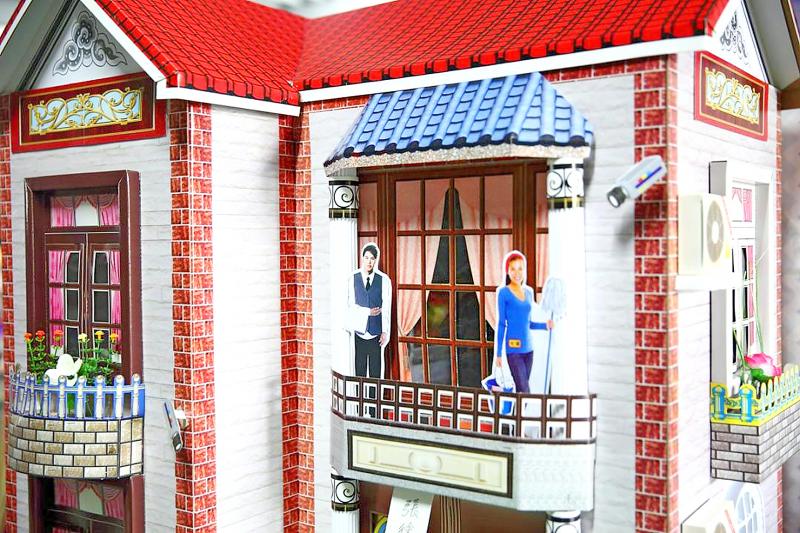Yang Hsien-chang (楊憲璋) is the third-generation head of his family’s traditional zhizha (紙紮) workshop in Kaohsiung.
Zhizha is the craft of making models of worldly goods to be given to the underworld, either to placate ghosts or so ancestors can have a better afterlife.
Yang said he originally wanted to be a pastry chef, but he had grown up watching zhizha being made.

Photo: Lee Hui-chou, Taipei Times
“Later on, worried that the art of zhizha would die out, I decided to take up the family trade,” said Yang, who has been in the business for more than two decades and has created all types of figures and buildings.
Any products that require shaping, regardless of the recipient — Taoist of Buddhist deities, ancestors, or the spirits “released” from the underworld on the seventh month of the lunar calendar — is made by a zhizha artisan, he said.
“It is a traditional handicraft that helps bridge the living and the dead, using the items to convey the memories of the deceased by the living to those who have passed,” Yang said.
Most clients want to give “the absolute best” to the deceased, whether that means a house, a car, or in modern times, popular electronic products, such as the newest cellphones or household appliances, Yang said.
“Some have requested that I make an entire sanheyuan (三合院, a traditional three-side courtyard building), or the newest model of a Tesla,” he said.
Asked what request had made the greatest impression, Yang said it was one for human organs.
“It could be that the deceased had passed from disease or an accident that caused them to lack an organ,” Yang said, adding that it was a token of the client’s goodwill that they wished to make the deceased whole in the afterlife.
Yang said his workshop could meet any request, with the only difference being the quality of the product and the time required to make it.
On average, the workshop can produce a model of a house, or a mansion, within five to seven days, but if the client requests a more detailed house, the project would require at least 10 days, Yang said.
The price range is based on the level of customization, with the going rate for houses starting at NT$10,000 to NT$20,000, and going up to NT$100,000 depending on the level of detail and the furnishings, Yang said.
Other items, such as scooters, vehicles and electronic products, cost between NT$3,000 and NT$5,000, with more detailed vehicles, such as Harley-Davidson motorcycles, going for NT$100,000 per item, Yang said.
While the workshop has been upgraded with modern technology and Yang has made some modifications to streamline production, “it is just different to make things by hand. It truly reflects the sincerity of the individual making the offering, as well as the craftsman,” he said.
Like all traditional handicrafts, especially as zhizha are offered to the dead, there are certain rituals to observe, such as houses that must always be paired with servants and be accompanied with a “deed” with the name of the recipient written on it.
“It is like real-estate purchases in real life, you have to include the land for them to have the house on,” Yang said.

CAUTION: Based on intelligence from the nation’s security agencies, MOFA has cautioned Taiwanese travelers about heightened safety risks in China-friendly countries The Ministry of Foreign Affairs (MOFA) yesterday urged Taiwanese to be aware of their safety when traveling abroad, especially in countries that are friendly to China. China in June last year issued 22 guidelines that allow its courts to try in absentia and sentence to death so-called “diehard” Taiwanese independence activists, even though Chinese courts have no jurisdiction in Taiwan. Late last month, a senior Chinese official gave closed-door instructions to state security units to implement the guidelines in countries friendly to China, a government memo and a senior Taiwan security official said, based on information gathered by Taiwan’s intelligence agency. The

The National Immigration Agency (NIA) said yesterday that it will revoke the dependent-based residence permit of a Chinese social media influencer who reportedly “openly advocated for [China’s] unification through military force” with Taiwan. The Chinese national, identified by her surname Liu (劉), will have her residence permit revoked in accordance with Article 14 of the “Measures for the permission of family- based residence, long-term residence and settlement of people from the Mainland Area in the Taiwan Area,” the NIA said in a news release. The agency explained it received reports that Liu made “unifying Taiwan through military force” statements on her online

Taiwan Semiconductor Manufacturing Co (TSMC), the world’s largest contract chipmaker, said yesterday that it is looking to hire 8,000 people this year, at a time when the tech giant is expanding production capacity to maintain its lead over competitors. To attract talent, TSMC would launch a large-scale recruitment campaign on campuses across Taiwan, where a newly recruited engineer with a master’s degree could expect to receive an average salary of NT$2.2 million (US$60,912), which is much higher than the 2023 national average of NT$709,000 for those in the same category, according to government statistics. TSMC, which accounted for more than 60 percent

A magnitude 5.7 earthquake struck off Taitung County at 1:09pm today, the Central Weather Administration (CWA) said. The hypocenter was 53km northeast of Taitung County Hall at a depth of 12.5km, CWA data showed. The intensity of the quake, which gauges the actual effect of a seismic event, measured 4 in Taitung County and Hualien County on Taiwan's seven-tier intensity scale, the data showed. The quake had an intensity of 3 in Nantou County, Chiayi County, Yunlin County, Kaohsiung and Tainan, the data showed. There were no immediate reports of damage following the quake.